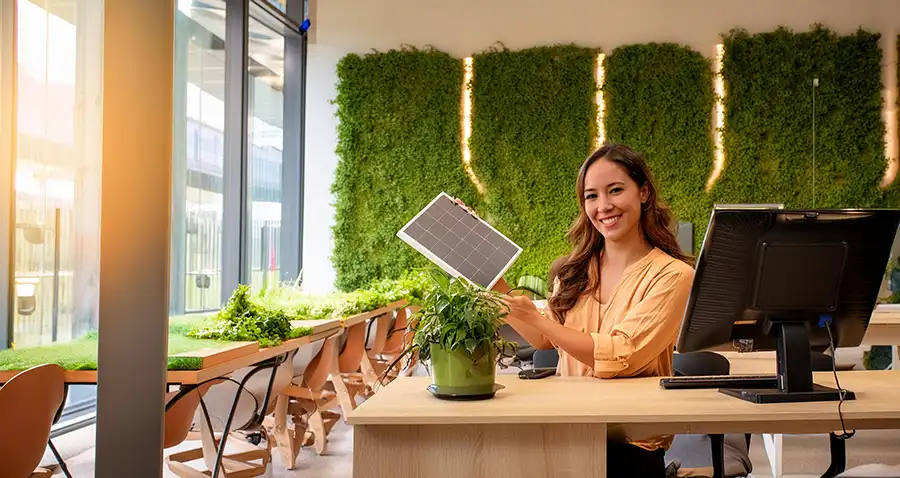

As small business owners, we’re always on the lookout for opportunities to make our businesses stronger and more successful. Green technology represents one such opportunity that could not only reduce our operational costs but also enable us to contribute to a more sustainable future.
There has been a lot of buzz about green technology and for good reason. This term refers to products, services, or practices that use renewable materials and energy sources, reduce emissions and waste, and have a minimal impact on the environment. But beyond its environmental benefits, green technology offers numerous advantages for small businesses.
For instance, installing solar panels or wind turbines can drastically cut down energy bills. Similarly, making use of energy-efficient equipment or smart automation systems can result in significant savings in the long run.
By integrating green technology into our operations, we not only achieve cost efficiency but also gain a competitive edge. Nowadays, consumers are becoming more environmentally conscious. They’re actively seeking out businesses that share their values and demonstrate a commitment towards sustainability. By promoting our green tech initiatives, we can attract these mindful consumers and enhance our brand image in their eyes.
Let’s consider the example of a small restaurant switching to biodegradable takeaway containers. Such a move not only reduces the restaurant’s environmental footprint but also helps it stand apart from competitors who continue to use non-biodegradable packaging. Moreover, it sends a clear message to the customers about the restaurant’s commitment to the environment.
Green technology isn’t just about saving money or attracting customers. It’s also about anticipating and preparing for the future. As society moves towards a more sustainable lifestyle, regulations are bound to become stricter, and demand for environmentally-friendly products and services is only going to increase. By adopting green technology early on, we position ourselves to meet these upcoming challenges head-on and set our businesses up for long-term success.
To illustrate, take a small manufacturing business that chooses to adopt cleaner production methods, using less energy and producing less waste. Not only does this decision lower operational costs, but it also ensures the business is well-prepared to meet future environmental regulations, giving it a leg up over competitors who are slower to adapt.
In conclusion, green tech isn’t just a ‘nice to have’ – it’s a clear business strategy that can provide tangible benefits for small business owners. From cost savings to competitive advantage and future-proofing, green technology is indeed an asset worth investing in.
For a small business owner, the implementation of sustainable innovations can lead to substantial cost savings in the long run. Sustainable technology often focuses on efficiency, meaning that resources are used to their full potential, reducing waste and cutting costs as a direct result. In particular, green energy technologies, such as solar panels or wind turbines, can dramatically cut down your enterprise’s energy bill. For example, businesses that have integrated solar panels into their operations have seen an average decrease of 75% in their energy expenditure.
The environmentally-conscious customer isn’t a niche market anymore, it’s a growing majority. By adopting sustainable practices, your business aligns itself with these values, which can greatly enhance your brand reputation. This stance towards sustainability can create a stronger bond between your business and potential customers, fostering trust, loyalty and ultimately driving sales. An example is Patagonia, a clothing brand that has built their name around sustainable and ethical business practices. Despite their products being priced higher, they enjoy a loyal customer base who appreciate their commitment to the environment.
By committing to sustainable practices and innovations, businesses open themselves up to funding opportunities otherwise unavailable. There’s a growing number of investors and schemes which specifically target companies attempting to make a positive environmental impact. For instance, the UK government’s ‘Innovate UK’ programme offers grants and support for businesses developing green technologies. Furthermore, evidencing a commitment to environmentally-friendly practices can also introduce the chance of preferential loan rates from green lenders.
Remember, the move toward sustainability is more than just a trend. It’s a necessary adaptation with tangible benefits that not only ensure the viability of your enterprise but also contribute to the wider goal of preserving our planet.
Small business owners in today’s highly competitive market are constantly on the lookout for efficient and cost-effective methods to streamline their processes and enhance productivity. This is where the application of green technology solutions comes into play. Not only does it enforce sustainable practices, but it also provides significant benefits that can bolster the growth and profitability of small enterprises.
Integration of green technologies into your small business operations can lead to a marked improvement in efficiency. An example of this can be seen with LED Lighting Solutions. Many businesses have made the switch from traditional lighting systems to LEDs, resulting in tremendous savings on energy bills, reducing overhead costs significantly. The resulting decrease in energy consumption also substantially lowers the businesses’ carbon footprint, making it more sustainable.
Tapping into renewable energy sources can also provide a new level of resilience to small businesses. For instance, solar power technology not only represents a clean, green source of energy, but its implementation can provide considerable reductions in energy costs over time. As energy prices continue to fluctuate, having a consistent, self-replenishing power source will give your business a competitive edge.
Beyond direct operational benefits, small businesses incorporating green technology can enjoy enhanced reputation and customer loyalty. Research indicates a significant proportion of customers now value sustainability and are more likely to support businesses that share this ethos. An excellent example can be seen in companies like Green Tomato Cars, London’s first hybrid car service. Their commitment to green practices has made a significant impact on their brand image, resulting in increased client retention and positive word-of-mouth referrals.
As a small business owner, making the move towards more environmentally friendly practices might seem intimidating at first. However, it is essential to understand that this transition isn’t merely a trend; it’s a gateway to significant long-term benefits for your business. Sustainability often drives innovation, which can lead to cost savings, increased operational efficiency, and enhanced product quality.
Take, for instance, switching to energy-efficient lighting; not only does it reduce your carbon footprint, but it can significantly reduce your overhead costs in the long run. Similarly, adopting cloud-based solutions instead of paper can streamline operations and cut down waste, saving you both space and expenses.
Sustainable innovations, such as green tech, not only help protect our environment, but also offer endless possibilities for enhancing your business operations. For example, implementing solar energy in your business operations can dramatically slash your energy bills, allowing you to channel those resources to other critical areas like marketing or staff training. Moreover, customers nowadays are increasingly drawn to businesses that take on environmental responsibility—implementing green technology could significantly boost your reputation and attract a broader customer base.
Despite the multiple benefits of switching to eco-friendly practices, some hurdles may arise during the transition. It’s crucial, as a business owner, to face these challenges head-on. Initially, there might be substantial upfront costs associated with implementing green technologies or practices. However, consider it an investment for a secure and profitable future.
For example, one might see the purchase of an electric delivery vehicle as an unnecessary expense when compared to the cost of a conventional van. However, the lower running and maintenance expenses tilt the scales over time. Coupled with the potential marketing advantage gained from being labelled ‘green’, the choice becomes easier to make.
Equivalent strategies can be applied to any obstacle you may face in this journey. It’s all about adopting a proactive, forward-thinking approach and remembering that every step towards sustainability is a stride towards a more profitable and ethical business.
As a small business owner, the adoption of green technology presents significant opportunities for operational efficiency, cost savings and brand image enhancement. Innovations in sustainable tech are not just accessible to big corporations, but are increasingly becoming feasible options for smaller enterprises.
For instance, the integration of energy-efficient equipment such as smart lighting systems and energy management software can considerably reduce utility costs. These technologies use sensors and automation to optimise energy use, thereby minimising wastage and maximising savings. Take for example, a small retail outlet switching to LED lights which consume less power and have a longer lifespan compared to traditional bulbs, allowing a decrease in both energy and maintenance costs.
The growing demand for clean and sustainable solutions also opens up new realms for business expansion. Eco-friendly product lines cater to shifting consumer preferences towards sustainability, creating the potential to explore new markets and attract more conscious consumers.
Examples abound in industries like fashion and food where businesses are launching ‘green’ versions of their products. The rise of ‘plant-based meats’ and ‘eco-friendly clothing’ are testament to this trend. Thus, green tech enables small businesses to stay competitive and future-proof by aligning with evolving market demands.
Moreover, by adopting green technology, small businesses can augment their brand image and establish stronger relationships with stakeholders. It allows businesses to demonstrate social responsibility and contribute to broader environmental goals, enhancing goodwill and trust among customers, suppliers, investors, and the wider society.
Consider the example of a small local coffee shop sourcing fair-trade, organic beans and using biodegradable cups. This not only reduces their environmental footprint but also bolsters their reputation as a socially responsible business, appealing to today’s environmentally-aware consumers.
Overall, the implications of green tech for small businesses are far-reaching, providing a framework for them to operate more efficiently, expand their growth prospects and build a reputable brand in the contemporary business landscape.
If you would like any guidence on how to move your business forward, G&G has the necessary skillset to help you manage your business more efficiently and more profitably. if you would like some assistance, please dont hesitate to contact us.
From business planning or Business Administration to assisting with your organisations growth, we are happy to advise and help where we can. Get in touch to start your no-obligation consultation!
Share this article: